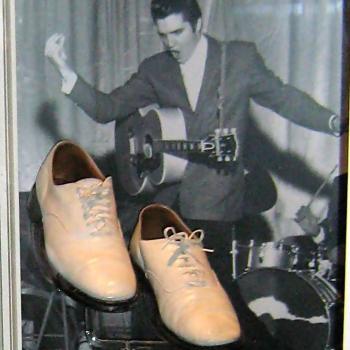See what I did there?
Anyway, I have a whole lot of random notes or clarifications about that earlier post and no real organizing principle for them, so I will just throw them out here in a list.
* I think I expressed myself poorly earlier, since some people seem to have read the initial post as saying, “With some addictions you need to treat underlying physical or emotional factors first, so that you can point out to the person that their real needs are spiritual.” This isn’t what I meant and in fact it’s still treating all addictions as if they’re the same, as if they’re all reducible to spiritual problems once you’ve cleared away the clutter.
Obviously I do believe that everyone basically needs God. But think of it this way: If somebody has been in a car wreck or been diagnosed with cancer, the best response is not, “Okay, we’ll set all your broken bones/help you figure out the best cancer treatment for your situation, but you’re never going to recover unless you turn your life over to God.” This is likely to produce resentment and frustration, because it’s not true–even though severe physical trauma or illness really does bring some people to deep faith. Similarly, if somebody’s addiction is primarily based on genetic predisposition or other biological factors, or it’s a coping mechanism for emotional trauma… they really may not need faith in order to recover, and pushing it on them is neither charitable nor credible. It also risks instrumentalizing Jesus. Love of God is important because God is Love, and worthy of all our love, not because God will help you get better, even though He often also does help you get better.
* As best I can tell (and part of the problem here is that we’re often not the best judges of our own internal lives, but we’re typically even worse judges of other people’s!), my own addiction and recovery have been basically spiritual in nature. I relate pretty much not at all to what Maia Szalavitz says in describing her own recovery process, and can’t help but feel a kind of, “Oh, you used to think that through grace you had been rescued from the pit! Why did you give that up just for self-empowerment?” I do not understand self-actualized individuals, and I fear them! One of the biggest breakthroughs when I was first getting sober was realizing that I didn’t have to stand on my own two feet: I could surrender and be carried by Christ. I didn’t need to be a morally strong, good person. I could accept myself as a basically weak person and it didn’t matter because my own strength was not what I was relying on.
And yet it would be ridiculously self-centered to project my own spiritual life onto every other addict. I can write about the sublimity of surrender or the theology of it, but I can’t tell other people that they need it to get better, because manifestly they don’t. Telling people they’re wrong about what they experienced because it isn’t what you experienced is pretty close to the opposite of humility: It’s stamping your own face across the whole world. Moreover, projecting my own spiritual life onto other people will make it harder for me to speak with them even about faith, since they may respond better to totally different metaphors: liberation, for example, rather than surrender.
* “‘Addiction’ is a contemporary umbrella term which covers a startlingly broad range of experiences. It’s neither an Aristotelian natural kind nor a Christian theological category.” If that sounds to you like something I also say about the term “homosexuality,” you are not wrong. This is one reason there can’t be a simple, one size fits all “Christian response to” either of these terms.
* I do think sometimes the moral drama of addiction and recovery can be a way for individuals to play out religious longings–for repentance, for a new identity as a better person, for freedom from “the bondage of self”–in a culture which has not taught them any religious language. People also use exploration of their sexuality or gender this way. It’s almost a replacement for rituals of adulthood: self-discovery followed by return to the community under a new identity. That said, I don’t think I’m a very good judge of when people are “just” using drug abuse, recovery, or sexuality as ways of expressing some other, suppressed need they have, and when they’re “really” addicts or gay or whatever; and I don’t think you’re a very good judge of that either.
* Maybe one illustration of the existence of very different types or styles of addiction is this: Lots of people read about drugs to treat a particular kind of addiction and think, “Oh, please let this work for me!” I read these stories and think, ruefully, “The thing is, though, I’d never take it….” These two responses kind of obviously require different pathways to recovery.
* More on regulating rehab/treatment: Hey, I already have tags for the two opposing problems here! On the one hand I absolutely do not want to turn over spiritual guidance to the regulation of doctors and policemen. On the other hand abuse of power comes as no surprise, and that has been proven over and over and over again in addiction treatment. (And there’s a religious angle, but not the one you wanted!–no, seriously, read that link.) In discussing the cultural and spiritual failures of the first approach it’s easy to forget the horrors of the second.
OK, that is all for now. Again, I do not feel like I understand this stuff super well so please do write in with any thoughts, comments, criticisms, howls of fury, etc etc….











